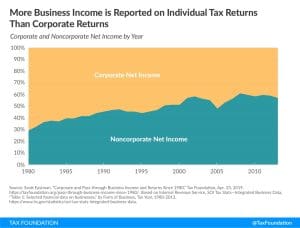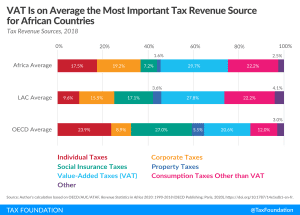The economic crisis caused by the coronavirus pandemic poses a triple challenge for tax policy in the United States. Lawmakers are tasked with crafting a policy response that will accelerate the economic recovery, reduce the mounting deficit, and protect the most vulnerable.
To assist lawmakers in navigating the challenge, and to help the American public understand the tax changes being proposed, the Tax Foundation’s Center for Federal Tax Policy modeled how 70 potential changes to the tax code would affect the U.S. economy, distribution of the tax burden, and federal revenue.
In tax policy there is an ever-present trade-off among how much revenue a tax will raise, who bears the burden of a tax, and what impact a tax will have on economic growth. Armed with the information in our new book, Options for Reforming America’s Tax Code 2.0, policymakers can debate the relative merits and trade-offs of each option to improve the tax code in a post-pandemic world.

New York Lawmaker Looks to Sin Taxes Once More
New York already suffers from significant smuggling of untaxed tobacco products—smuggled cigarettes accounted for 53 percent of cigarettes consumed in the state in 2018—and further increasing tobacco taxes is likely to make matters worse.
3 min read
Reviewing Effective Tax Rates Faced by Corporate Income
Economists have proposed taxing corporate income more uniformly through corporate integration, which can be done in a variety of ways. Biden’s plan goes in the opposite direction by making worse the double taxation of corporate income.
5 min read
No ‘Stealth Tax Hike’ in 2021, but Individual and Business Tax Increases Loom
While there are many tax changes built into the tax code over the coming years for individuals and businesses, the recent claim that lower- and middle-income Americans may see a “stealth tax increase” in 2021 due to the Tax Cuts and Jobs Act (TCJA) is untrue.
3 min read
OECD Report: Tax Revenue in African Countries
Taxes on goods and services were on average the greatest source of tax revenue for African countries, at over 50 percent of total tax revenues. VAT contributed on average 30 percent, making it the most important tax on goods and services.
6 min read
Biden Could Provide Business and Household Relief by Eliminating Trump Tariffs
Biden has not specified how he would approach the Trump tariffs, though his advisers have said he will at least review them.
5 min read
Increasing the Tax Burden on Capital Investment and Automation Hurts Workers
There has been an ongoing debate about how automation and the use of robots in the workplace has impacted workers’ wages and employment. Recently, MIT and Boston University economists examined whether tax policy favors certain forms of automation that puts workers at a competitive disadvantage.
7 min read
No, We Don’t Need a Federal Work-From-Home Tax
A recent Deutsche Bank analysis proposes a federal work-from-home tax (“privilege tax”), which is designed to strip away the financial benefit of remote work.
5 min read

New Jersey May Be the First State Without an Excise Tax Levy on Recreational Marijuana
New Jersey’s tax design adds another element to the ongoing experiment with legal recreational marijuana in the states.
3 min read